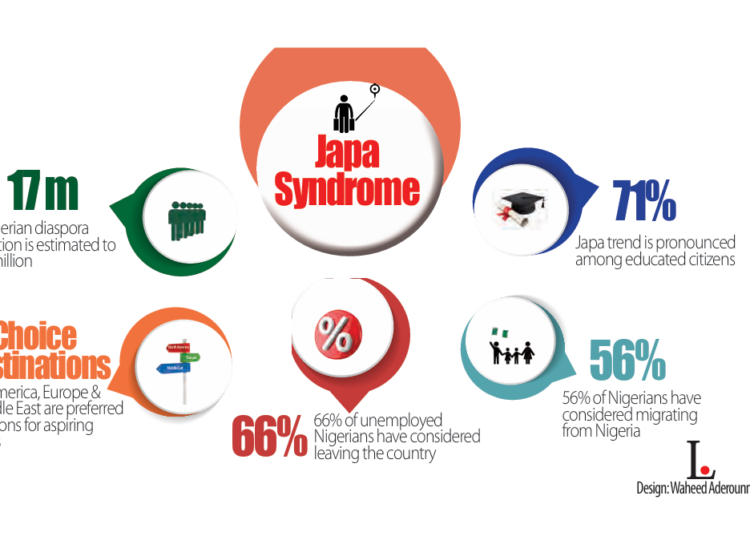As more Nigerians are eager and willing to leave the country in search of greener pastures abroad for various reasons, there are concerns that the Japa syndrome, if not quickly addressed, may further deplete the country’s workforce, findings by the LEADERSHIP Data Mining Department have shown.
Japa is Nigerian informal term that roughly translates to citizens leaving the country without intending to return. Japa combines the Yoruba expression já pa, meaning “to run” or “flee,” as per migration.
There are growing concerns that the export of human capital has created significant workforce gaps across various sectors of the Nigerian economy. Analysts highlight the health sector as the most severely affected, with an alarming exodus of doctors and nurses in recent years. Similarly, the Information and Communication Technology (ICT) and engineering sectors have also felt the impact of the “Japa” syndrome.
Experts warn that the ongoing brain drain from this trend could lead to a loss of potential entrepreneurs and a critical shortage of skilled professionals. Moreover, according to the experts, employees are increasingly losing faith in the country’s economic prospects, with many determined to migrate despite incentives offered by employers to encourage them to stay.
READ ALSO: He Who Japas May Eventually Japada
Of late, the economic policies of the recent administrations have led to hyper inflation and wiped out most paid workers’ purchasing power, making more people willing to look for better opportunities abroad.
Recently, the Oyo State Nigerian Medical Association (NMA) Chairman, Dr Happy Adedapo, appealed to the governments to incentivise health workers and doctors to reduce ‘japa’ syndrome in Nigeria.
In an interview with the newsmen in Ibadan, he remarked that the ‘Japa’ syndrome, one of the significant challenges faced by health workers in 2024, would be reduced to the barest minimum if doctors were made comfortable.
He said, “It’s not too much for the government to give car loans to doctors to encourage them and keep them in the system. The Japa syndrome should be reduced to the barest minimum.”
Also, many Information and Communications Technology (ICT) experts have raised concerns that Nigeria’s economic progress could be significantly hindered by the ongoing exodus of tech talents seeking better opportunities abroad.
One of these experts, the chief executive officer of Agotech Solutions, Mr Wale Adedeji, called on the government to implement measures to curb this brain drain. He highlighted that one of the persistent challenges in the IT sector is the high cost of retaining talent. According to him, international companies increasingly recruit skilled professionals from Nigeria, drawn by the country’s reputation for producing exceptional tech talent.
To address this issue, Mr. Adedeji suggested a multi-faceted approach.
He emphasised the need for the government to establish and fund learning hubs where individuals can acquire in-demand skills.
He also proposed significant infrastructure investment to facilitate business ease.
According to him, creating a local version of Silicon Valley in Nigeria—with tech parks, free hotspot zones, and widespread internet access—would empower youths and tech enthusiasts, fostering innovation and reducing the allure of relocating abroad.
Data gathered showed that 56 percent of Nigerians have considered migrating from the country, marking a significant 20-percentage-point increase from the 2017 figure of 36 percent, according to a report by Afrobarometer, a pan-African research network.
“The share that says they have given ‘a lot’ of thought to the idea has tripled, from 11 percent to 33 percent,” the report stated.
The data shows this trend is particularly pronounced among the most educated citizens. Nigerians with post-secondary qualifications comprise 71 percent of those considering migration, while urban residents and youth represent 63 percent and 60 percent, respectively.
Afrobarometer attributes the desire for migration to seeking better opportunities, employment prospects, and relief from economic hardship.
“The most common reasons cited for potential emigration are finding work opportunities (42%) and escaping economic hardship or poverty (39%),” the report noted.
Preferred destinations for aspiring migrants include North America, Europe, and the Middle East. The report also highlights that two-thirds (66%) of unemployed Nigerians actively seeking work have considered leaving the country. Among those employed, 58% of full-time and 56 percent of part-time workers have expressed similar intentions.
Migration from Nigeria has surged in recent years. Between January and September 2023, 1,574,357 people left the country, bringing the total number of emigrants in the past two years to 3,679,496.
A separate survey by the African Polling Institute in 2022 found that 69 percent of Nigerians aged 18–35 would relocate if given the opportunity. This exodus has contributed to a significant brain drain, particularly in the health sector, as professionals leave for better working conditions abroad.
Experts said the government has failed to address underlying issues and implement effective measures to curb the ongoing emigration crisis. Beyond the brain drain, the migration wave has strained family ties and disrupted communities, according to the experts. Despite these challenges, the economic hardships, systemic failures, and other factors driving migration remain unresolved.
According to Banji Alimi, an HR expert, many of these migrants graduated from Nigerian universities, which are highly subsidised by the government. Those seeking greener abroad take years of training and skills acquired locally.
Chief executive officer of OLM Consulting, Joshua Coker, said the “japa syndrome” had triggered a significant shift in the labour market, transitioning it from employer-centric to employee-focused.
He attributed this wave of migration to poor working conditions, inadequate remuneration, insecurity, and challenging economic realities.
Coker further noted that additional factors, such as the deteriorating state of the economy, the high cost of living, and human rights violations had also driven young Nigerians to seek better opportunities in developed countries.
He mentioned that he once read an article about a significant wave of Indian migration to countries like the United Kingdom and the United States during the 1970s, 1980s, and 1990s. However, many of these individuals eventually returned to India, where they played a pivotal role in advancing the nation’s achievements in technology, medical sciences, and other fields.
Coker said that regarding relocation, India comes first, followed by Palestine and then Nigeria in the context of migration to the United Kingdom.
According to recent data, approximately 3,679,496 Nigerians have left the country in the past two years. The International Organisation for Migration estimates the Nigerian diaspora population to be around 17 million as of 2024.
Migration expert Charles Dickson observed that despite the arduous visa application processes, the dangers associated with some migration routes, and the often inhumane treatment Nigerians face abroad, the exodus continues unabated. He attributed this persistence to the resilience and tenacity of Nigerians, who endure significant hardships while holding onto the hope of a better future—something many feel is unattainable at home.





